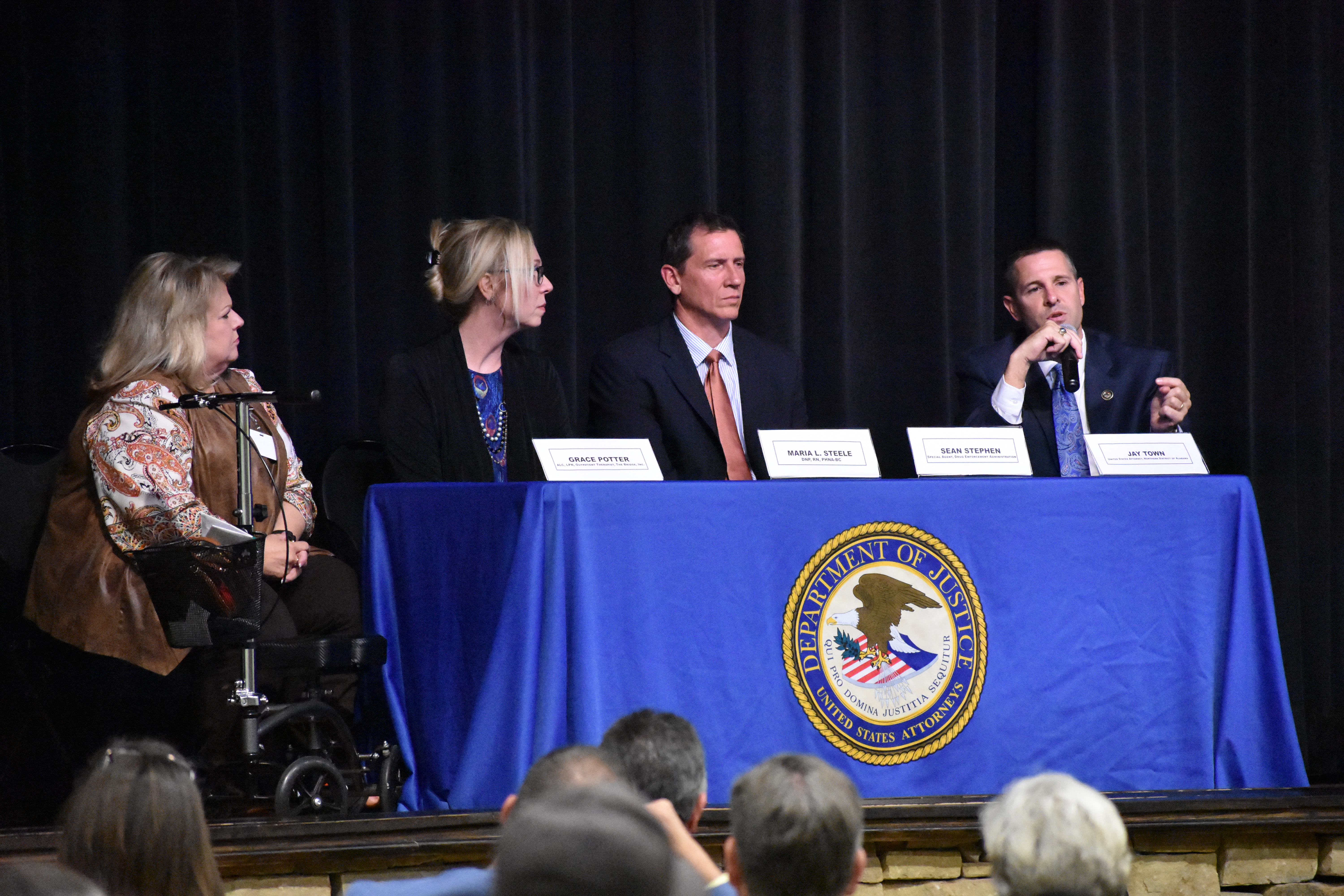Panelists (L-R) Grace Potter, Maria Steele and Sean Stephen listen to U.S. Attorney Jay E. Town (right) at Tuesday night’s opioid crisis town hall meeting in Cullman. (W.C. Mann for The Cullman Tribune)
CULLMAN – On Tuesday evening, the U.S. Department of Justice came to town to talk about the opioid crisis facing Alabama. U.S. Attorney for the Northern District of Alabama Jay E. Town and his staff chose Cullman for the first in what is to be a series of town hall meetings to confront the problem that has claimed numerous lives in Cullman County.
Before the meeting, Town told The Tribune, “Just like any other city, any other population center in the northern district of Alabama, Cullman is not a stranger to the opioid crisis–to fatal and non-fatal overdoses. And it impacts every community, and it certainly has impacted the county of Cullman and certainly the city, as well.
“One of the things that we are trying to do better is we are trying to track, not only fatal overdoses, but our non-fatal overdoses. Saving lives is really what President (Donald) Trump and Attorney General (Jeff) Sessions have tasked the U.S. Attorney community with doing, and one way to do that is to, certainly, find ways to track, real-time, fatal and non-fatal overdoses. And so, I have met with Sheriff (Matt) Gentry here in Cullman County, and we have come up with a way, using our 911 call data, using some of the automated systems that our software allows us, so that we can get real-time information on 911 calls about fatal and non-fatal overdoses, so that we can police it accordingly.
“If there’s sort of a spike in overdoses, we can learn about it in real time, so that we can surge resources to that area. We can police that area more aggressively. We can do a public service announcement, because perhaps there’s a bad batch, and that’s why we’re seeing this sort of increase in overdoses.
“The goal is to save lives. Yes, we’re going to prosecute more people: we’re going to prosecute drug dealers, we’re going to prosecute people who have dealt drugs that resulted in an overdose of some sort; that’s going to happen. We’re going to prosecute doctors who have sacrificed the efficacy of medical care for the greed of pushing pills and opioids. Yeah, that’s going to happen. But our goal, our ultimate goal in all of that is to save lives here in Cullman County, throughout the northern district, and indeed throughout the United States.”
North Alabama leads nation in opioid prescriptions
In a recently published study of available data from 2014-16, Alabama’s 4th Congressional District, which includes Colbert, Cullman, DeKalb, Etowah, Fayette, Franklin, Lamar, Lawrence, Marion, Marshall, Walker and Winston counties as well as parts of Blount, Cherokee, Jackson and Tuscaloosa counties, sees more opioid prescriptions than any other district in the nation. During the time period of the study, for every 100 people in the district, 166 opioid prescriptions were written.
Town called on physicians to be more responsible in prescribing medications, and on consumers to be more responsible in storing prescription drugs and disposing of unused medications.
While town hall meetings are just beginning to happen, the U.S. Attorney’s Office has been actively approaching the opioid issue for more than a year. In Aug. 2017, U.S. Attorney General Jeff Sessions formed an Opioid Fraud and Abuse Detection Unit to collect and analyze data on opioid abuse and selected the Northern District of Alabama as one of 12 districts across the country to participate in the pilot program.
According to the U.S. Attorney’s Office website, “As a participant, the Northern District will receive funding for three years for a prosecutor who will focus solely on investigating and prosecuting health care fraud related to prescription opioids, including pill mill schemes and pharmacies that unlawfully divert or dispense prescription opioids for illegitimate purposes.
“U.S. Attorney Jay Town established the Opioid Pilot Project Task Force (OPP) to implement and execute the pilot program and appointed a veteran prosecutor in the office to lead it. The OPP Task Force will work with the FBI, the Drug Enforcement Administration, the Department of Health and Human Services, and state and local law enforcement to investigate and prosecute pill mills and physicians and pharmacists contributing to the opioid epidemic. Through DOJ’s Opioid Fraud and Abuse Detection Unit, the task force will have the advantage of data analytics that can point to potential opioid prescribing abuses. The analytics can show physicians who are writing opioid prescriptions at a rate far exceeding that of their peers; the number of a doctor’s patients who died within 60 days of an opioid prescription; the average age of patients receiving the opioid prescriptions; pharmacies that are dispensing disproportionately large amounts of opioids; and regional hot spots for opioid issues.”
The audience heard a painful account by psychiatric nurse Maria Steele about her son Bryan, a former Cullman High School football player who died at age 20 from a drug overdose. She recounted his expulsion from the team after being caught with drugs on campus, his escalation through increasingly powerful drugs, his experiences in multiple treatment programs, and ultimately his death while attending a residential treatment program. Steele said she hoped that sharing such a personal story might help remove some of the stigma from addiction and lead to more addicts receiving the treatment they need.
After her presentation, Steele joined a panel that included Town, addiction recovery therapist and director of The Bridge adolescent substance abuse treatment center Grace Potter, and DEA Special Agent Sean Stephen for a discussion and question and answer session with the audience.
Tough words for prescribing doctors
Town told The Tribune that he will go after physicians who overprescribe opioid painkillers, saying that his office is tracking prescription numbers per doctor, and also said that his office partners with “nontraditional partners like your medical boards and some of your other state regulatory agencies that can actually impact and disrupt a doctor who we believe is prescribing outside of the population norms for that particular area. And that allows us to at least halt that doctor from prescribing poison for his (patients), or we can actually take his prescription license away, or maybe even his medical license could be suspended for a period of time, so that he or she has to be disrupted, either in the interim or permanently so that that poison–again, our goal is to save lives–so the less poison that’s out on the street, the better off our communities are. And that is our ultimate goal.
“But we are going to prosecute those people who are causing this addiction, causing these overdoses and directly related to this opioid crisis here in the Northern District. And I believe we have a really good handle on it, and I’m very anxious to see where we’re going to be in about a year and see how much our overdoses–fatal and non-fatal–have declined. I’m very hopeful that it will be, and to my judgment it will be.”
The town hall meeting was recorded and can be viewed on The Tribune’s Facebook page at www.facebook.com/CullmanTribune/videos/493540194498383/.
Copyright 2018 Humble Roots, LLC. All Rights Reserved.





























